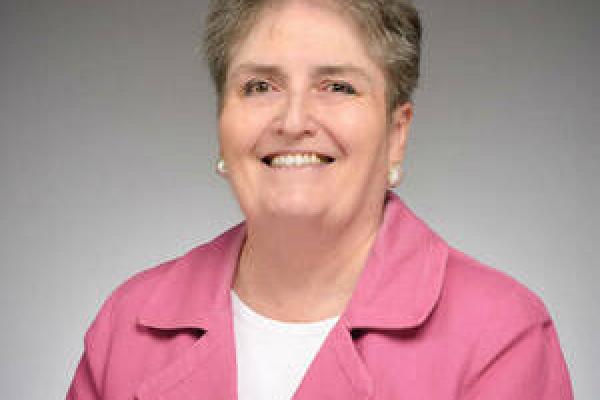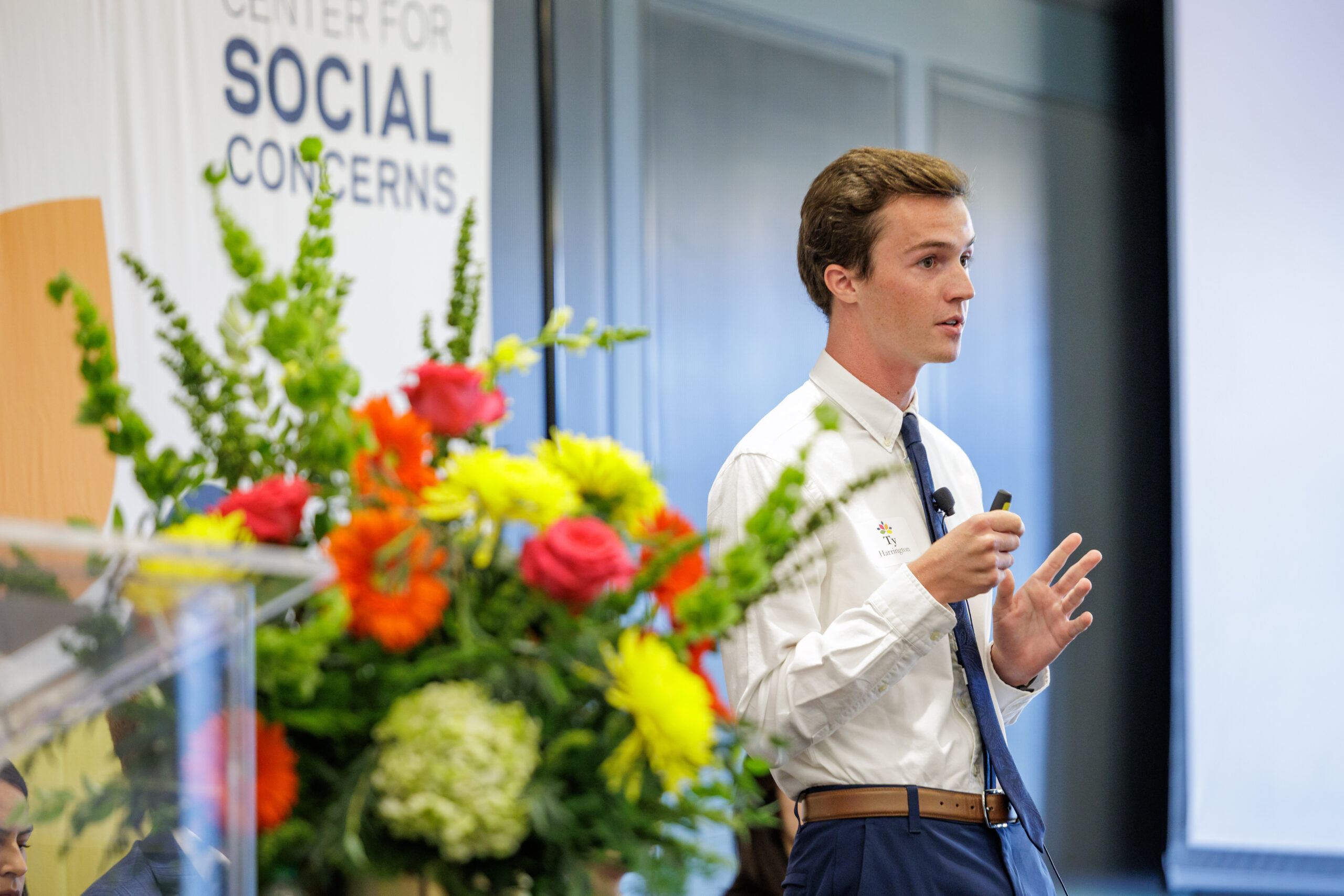Resonance: A Virtual Alumni Conversation
By: Mary Ellen Woods ’80
February 27, 2023

I have found that perspective–time and distance–offer special lenses that inform. We can look back in time and see how our experiences have evolved and how we understand those experiences given our present circumstances. In that light, I convened a virtual conversation among a group of Notre Dame and Institute for Social Concerns alums: Caitlin Urbain Powers and Brian Powers, Dr. Hamsa Subramaniam, and Dr. Eileen Doherty.
But first, some introductions: Dr. Eileen Doherty was a psychology and theology student, graduating in 1990. After graduation, she earned both a M.Div. and a Ph.D. from Loyola University in Chicago, Illinois. Doherty is the assistant dean for student affairs at the University of Illinois College of Medicine. She lives in Chicago and has an office in Peoria. Dr. Hamsa Subramaniam studied political science and peace studies and is a member of the class of 2007. She earned a MPH in epidemiology and global health from Columbia University and completed a Ph.D., also in epidemiology, from University of North Carolina at Chapel Hill and is now an epidemiologist at Verily Life Sciences. Caitlin Urbain Powers, `12 was a sociology major with a supplementary major in Spanish. Her husband, Brian Powers also studied sociology, graduated with Caitlin, and returned for a master in nonprofit management in 2022.
Love, Equity, and Vocation
To guide our conversation, I asked each center alum to reflect on the role the center played in their undergraduate experience and then to consider how the experience resonates today. And, while each person spoke meaningfully about the center, I cannot help but begin with the most poignant (at least to me)–with Caitlin and Brian. “First and foremost, because it’s how we got to know each other! And we’re now married!” We often say that Notre Dame is a connection for life, but in Caitlin’s and Brian’s experience, it is the center that brought them together and is a cornerstone of their married lives together. They describe their “getting to know each other” summer between their sophomore and junior years (2010) when they each did the Summer Service Learning Program (now known as NDBridge) in Chicago––Caitlin at Misericordia and Brian at Our Lady of the Angels/Kelly Hall YMCA in Humboldt Park. Caitlin also did another disability-focused SSLP at Krejci Academy, a fall break in Appalachia, and a Children in Poverty Seminar in New York. Brian, a musician, has performed in a number of center-sponsored concerts, most notably Playing for Peace to promote peacekeeping in Sudan.
Hamsa added that “the CSC made campus smaller for her. As a non-white, non-Catholic freshman, it was immediately clear that there weren’t many students on campus like her. She was grateful for space she had at the center through community, courses, and other programming. Not only was it geographically close to her dorm, it was a place to make real, meaningful, and lasting connections with students who embraced the values and identities that were important to her.”
Eileen said simply: “The center helped form her vocation to family life and developed a calling to foster the growth and development of students.”
I daresay that Our Lady is pleased with the gifts of love, a keen sense of equity, and a life’s vocation embodied in these wonderful graduates.
Lives dedicated to redressing inequality and playing music
As I reflect on each of the center alums with whom I talked, it was powerful to see the extent to which both their center experience and its values continued to resonate in their lives. Powerful, yet hardly surprising.
Looking back from the greatest remove, Eileen is reminded that “the CSC awakened me to the issues of injustice in our societies and our world. My work in higher education has been at institutions whose missions have sought to use education as a tool for transformative change for groups who have not had the same access to education as others, or who have otherwise been marginalized.” And, Hamsa, a practicing epidemiologist and mother of young children: “Reflecting on my trajectory, it’s clear that the motivating values throughout my life and work are equity and representation in health access, values very much formed during my time at the CSC. I am a first-generation American so the notion that college would (or should) offer enrichment beyond a classroom education was not something my parents expected. It is clear to us now that being part of the center throughout my undergraduate years has had a profound impact on my politics, my sense of services, my friendships and the way I interact with the world, and even the values I wish to pass on to my children.”
Youngest among the alums and closer to their center experience, the Powers’ lives also bear witness to their work with the center. Brian’s journey offers a new reflection on the theme of resonance: In preparing for this conversation, I was thinking about resonance as the “reinforcement of sound (or experience).” As Brian describes his life since graduating from Notre Dame, it offers another insight––the quality in a sound of being deep, full, and reverberating.” As he notes, “My path has been quite non-traditional. After college, Nicholas Gunty, ’12 and I formed Frances Luke Accord, a folk-pop songwriting duo. Our first album, Kandote, (recorded with the Barefoot Truth Children’s Choir in Kkindu, Uganda), came about through a CSC connection. After we toured nationally for several years, COVID provided me an opportunity to return to my sociology and center roots. While I continue to tour and release music with Frances Luke Accord(link is external) to this day, I also manage the strategic development of a San Jose-based nonprofit startup, Neighborhood Hands(link is external), that pays people experiencing homelessness to clean city parks, and work part-time for Latz & Company(link is external), a Chicago-based fundraising and organizational development consulting firm.” Caitlin’s journey includes an MPH at the University of Illinois at Chicago, time with Northwestern Hospital managing their disability health equity program, and presently leading FQA Institute for Social Impact(link is external), a non-profit that helps organizations optimize and scale solutions in the addiction space. And from both Caitlin and Brian, “For us, the CSC brought us to each other, shaped our career paths, and, most importantly, widened our worldviews. While we’re certainly biased, we think it should be mandatory for undergraduates to spend time with the CSC. The opportunities the center provides to get out of one’s comfort zone and into the real world can be hugely impactful to one’s journey. It certainly was for us, and we are immensely grateful for the important work the CSC does to this day.”
Hamsa’s reflection parallels the evolution of the center. Grounded in her time at Notre Dame, her life and career took her to various global locations including Chennai, India as an American India Foundation (now Banyan Fellow) where she worked with and learned from transgender people living with HIV. That experience informed her decision to pursue public health seriously. She returned to New York to get her MPH in epidemiology and public health. During and after her masters studies, she lived in East Africa working on various child health projects for UNICEF, WHO, and Helen Keller International, observing the lasting effects of colonial exploitation on nearly all domains of life on the African continent and the immense challenges in extending universal access to essential healthcare.
Eileen summarizes well what I heard from all the alumnae I spoke with: “My time at the Institute for Social Concerns, along with my faith development through the university, laid the foundation for the choices I would make in life–choices to serve others, to facilitate positive change where I can, and to put my trust in God to lead the way for me.”
Love thee.
Related Stories
-
ReSearching for the Common Good: Jenifer Guadalupe Solano Becerra
-
Engaging South Bend—University faculty explore research collaborations with regional organizations through institute’s Engage South Bend tour
-
Two paths, one destination—Postbaccalaureate research fellows join the institute to research mass incarceration
-
Extraordinary good for this world—Researching for the Common Good Symposium celebrates undergraduate summer research
-
Social Concerns Summer Fellow returns to India for ongoing research





